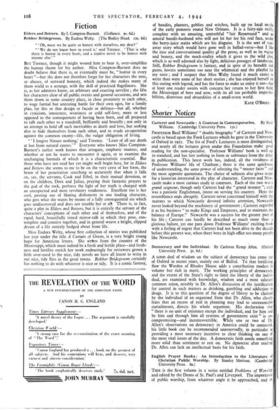Fiction
Elders and Betters. By!. Compton-Burnett. (Gollancz. 98. 6d.) Robber Bridegroom. By Eudora Welty. (The Bodley Head. los. 6d.) " Oh, must we be quite so honest with durselves, my dear?'
"' We do not know how to avoid it,' said Terence. That is why there is horror. in every heart, and a resolve never to be honest with anyone else.'" BUT Terence, though it might wound him to hear it, over-simplifies the human theme for his author. Miss Compton-Burnett does no doubt believe that there is, or eventually must be, "horror in every heart "—but she does not therefore forgo for her characters the uses, or abuses, of outward honesty, which indeed she makes many of them wield as a scourge, with the skill of practised flagellators. She is, as her admirers know, an arbitrary and exacting novelist ; she lifts her characters clear of all public events and general occasions, and sets them down in some country place, in close proximity to each other, to wage formal. but unresting battle for their own egos, for a family plan, for this or that design or facade or defence—but all, whether in cynicism, innocence, weariness or cold ,self-lov.e, more or less opposed to the consequences of having been born, and all prepared to talk each other to a standstill, brilliantly and brutally ; not only in an attempt to hold off such inevitables as death and love, but seeking also to hide themselves from each. other, and to evade co-operation against the common enemy—life, the vulgar obligation of living.
" I forgive Nature nothing,' said Terence. Least of all our death at last from natural causes.'" Everyone who knows Miss ComptonBurnett's earlier work knows that arrogant, emphatic 'manner, and whether or not he wants to encounter it again, or to examine the unchanging formula of which it is a characteristic essential. But those who have not read her yet might well begin here, for in Elders and Betters she seems to me to be on the very crest of her form, the beam of her penetration searching so acchrately that when it falls on, say, the servants, Cook and Ethel, in their mutual devotion, or on the children, Dora and Julius, praying their fantastic prayers to the god of the rock, perforce the light of her truth is charged with an unexpected and most revelatory tenderness. Excellent too is her cool, passing use of blazing dishonesty in one leading character, who gets what she wants by means of a fully consequential sin which goes undiscovered and does not trouble her at alt. There is, in fact, quite a plot in Elders and Betters, but it is entirely the servant of the characters' conceptions of each other and of themselves, and of the rapid, hard, beautifully timed mirror-talk in which they pose, contemplate and connive together, and in general weave a bright, clipped dream of a life entirely hedged about from life.
Miss Eudora Welty, whose first collection of stories was published last year under the title A Curtain of Green, is a very bright young hope for American letters. She writes from the country of the Mississippi, which must indeed be a fresh and fertile place—and freshness and fertility enrich her work endearingly for reviewers grown a little over-used to the nice, tidy novels we have all learnt to write in our nice, tidy flats in the great towns. Robber Bridegroom certainly has nothing to do with whatever is nice or tidy. It is a comic fantasy, of bandits, planters, goblins and witches, built up on local myths of the early pioneers round New Orleans. It is a fairy-tale really, complete with an amusing, untruthful "fait Rosamund" and an amoral bandit-husband who will not let her See his real face, under the berry-juice stains which are his disguise. It is the sort of tear. away story which would have gone well in ballad-verse—but I like the ease and conversational quality .pf the prose, as well as its vigour and beauty, and the mock-reality which it gives to the wild plot, which is so well adorned also by light, delicious passages of landscape. Still, Robber Bridegroom is fantasy, and in spite of its breadth and gusto, hovers sometimes too near the whimsical and the playful for my taste ; and I suspect that Miss Welty found it much easier to write than were some of her short stories ; she has enjoyed herself on this outing with legend, and has the force to make us enjoy it too—but at least one ,reader awaits with concern her return to her first field, the Mississippi of here and now, with its all too probable improbabilities, distresses and absurdities of a -small-town world.
KATE O'BRIEN.






















 Previous page
Previous page